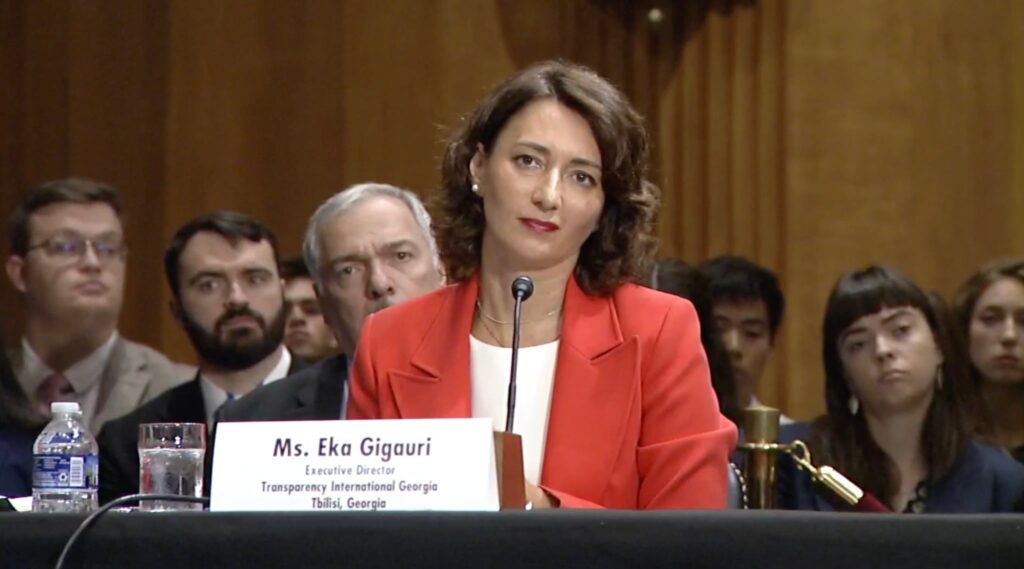
Eka Gigauri, Executive Director of Transparency International – Georgia (TI), testified at the Senate Foreign Relations Committee hearing about anti-NGO laws and other tools of democratic repression.
Below is her speech in full:
” Chairman Cardin,
– Ranking Member Risch,
– Distinguished Senators,
Thank you for the opportunity to speak at this hearing. I am thankful for the long-standing bipartisan support towards Georgia by this Committee.
My name is Eka Gigauri, I am the executive director of Transparency International Georgia – the largest Civil Society Organization working on good governance and corruption in the country. I am here to share a local perspective on resisting anti-NGO laws in Georgia, as well as my personal experience of being targeted as a human rights defender.
The introduction of anti-NGO laws in different parts of the world is an alarming and growing trend. Anti-NGO laws, first championed by Putin’s regime in Russia, enable a smooth shift towards consolidated autocracy. In countries like Georgia, when such laws are introduced, autocrats amplify Russian anti-Western disinformation, cultivate social division, and undermine partnerships with the U.S. and the EU—all against the will of the majority of citizens.
Prevailing in this struggle requires two key elements:
Unity among proactive citizens who have chosen freedom, valuing it enough to defend it; and
Consistently strong support from the international democratic community for the vibrant civil societies they helped develop and grow. In Georgia, this means the United States speaking and acting with legitimate moral authority, assertively and convincingly, as it has done for nearly three decades when it helped Georgians protect their sovereignty, independence, and democratic aspirations.
This is not to suggest that America should do the job for citizens who choose freedom over authoritarian rule. A free country is never granted, even by the greatest allies; it is earned by its citizens, for whom America has always been an inspiration.
The key point is that in places where pro-democracy movements are strong and America’s well-established partnerships are challenged by actors like Russia, as in Georgia, maintaining a high level of support in backing democratic aspirations of nations – can tip the balance.
In Georgia, the introduction of the anti-NGO law, commonly referred to as the “Russian Law,” sparked massive resistance. Yet, the authorities continue to push the red line to establish a Russian-style system of governance. For every citizen of Georgia, the upcoming elections on October 26 are essentially a referendum on a clear choice between a democratic, prosperous European future and the misery of being a Russian satellite.
If Georgian democracy is defeated and the country plunges into the Russian orbit again, this would mean an evaporation of chances for further democratic development of any country Eastwards or Southwards from Georgia. Geopolitically, this would mean Russia once again marking its backyard, claiming Georgia as part of its sphere of influence.
As per Russian playbook, autocratic objectives are simple: silencing critical voices, closing civic space, and neutralizing free media. Anti-NGO legislation is a convenient tool for these goals, providing a facade of legality.
In Georgia the process proceeded in Three Phases:
Phase 1: Preparing the Ground for Legalizing Repression.
In this phase, a massive coordinated smear campaign was launched against civil society, USAID, and U.S.-based democracy-promoting organizations. Among others, my family members and I have been subject to verbal attacks and intimidation by high-level public officials.Phase 2: Passing the Law Despite Public Opposition.
Despite mass protests and clear advice from U.S. and European allies, the law was passed. Mirroring Russian disinformation, authorities amplified coordinated disinformation, portraying civil society and their international supporters as a “Global War Party” destabilizing Georgia. The government adopted an openly anti-American stance and announced a shift away from strategic partnership with the West.Phase 3: Enforcement of the Law.
Phase 3 which is unfolding as we speak, involves the enforcement of the law. The repressive measures embedded in this law include:
Labeling NGO members and activists as “Foreign Agents,” a term deeply stigmatized in Georgia due to its Soviet-era connotations.
Imposing heavy fines and seizing assets of those who refuse to register as agents or fail to provide requested information.
Requiring NGOs to disclose sensitive personal data, with refusal leading to penalties or asset freezes.
The situation in Georgia is dramatic, but I am not here to seek sympathy. In Georgia, we are engaged in a generational and existential struggle, defending sovereignty, independence, and the dream of a democratic future. We are determined to stand our ground.
We are not alone. American and European allies support the Georgian people by delivering clear messages to autocrats, reassuring pro-democracy actors, sanctioning those who undermine democracy, and initiating the MEGOBARI Act and Georgian People’s Act. This support is deeply appreciated by every Georgian who chooses freedom over oppression.
Georgians understand that freedom is never granted but always earned, as it has been throughout our history. With the support of America and its allies, we once built an emerging democracy that has been an inspiration in our part of the world, and I believe that, with your help, we will prevail once again.
I am happy to answer your questions including, on how to make America’s strong support to the Georgian people most effective.”





